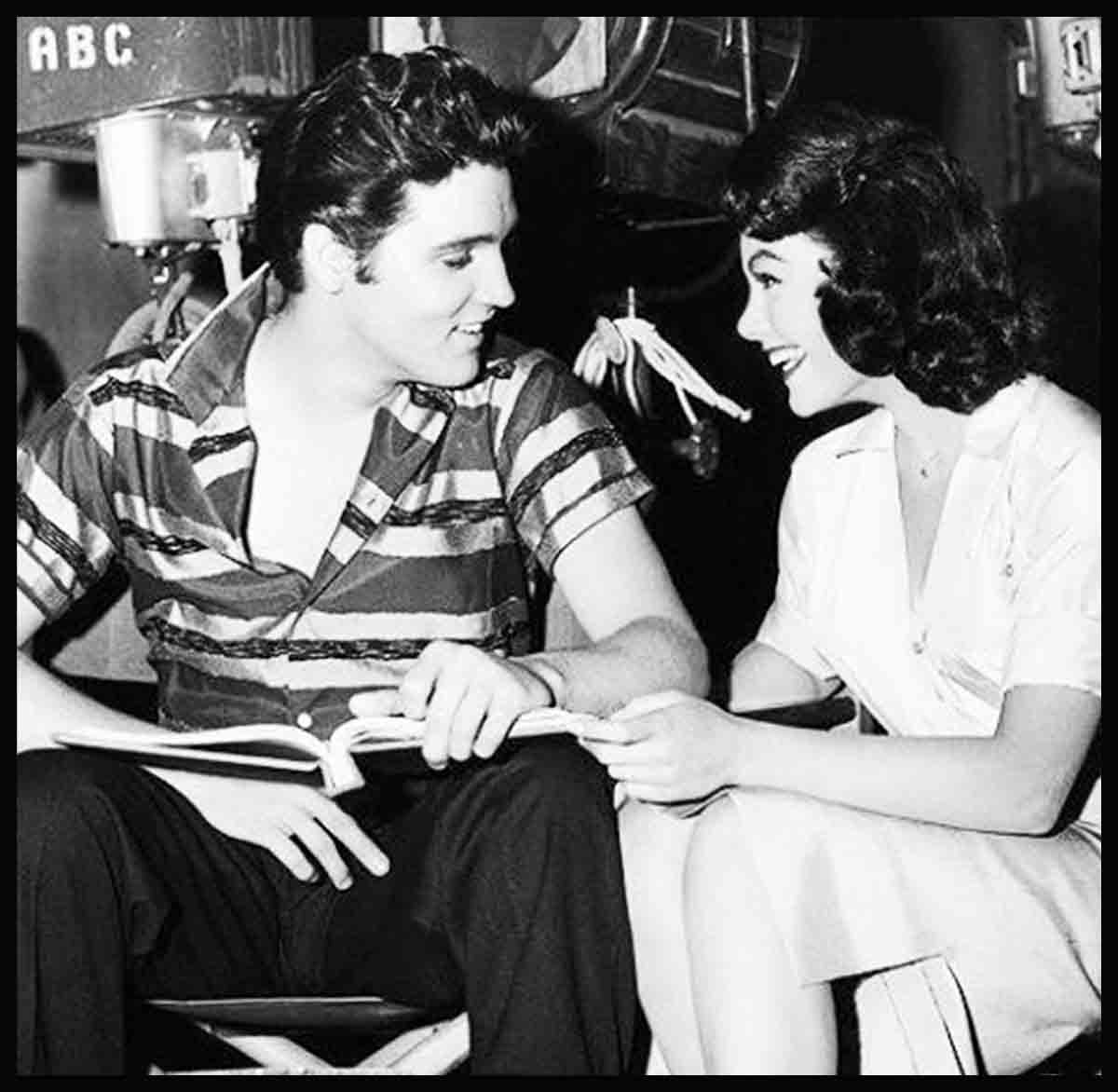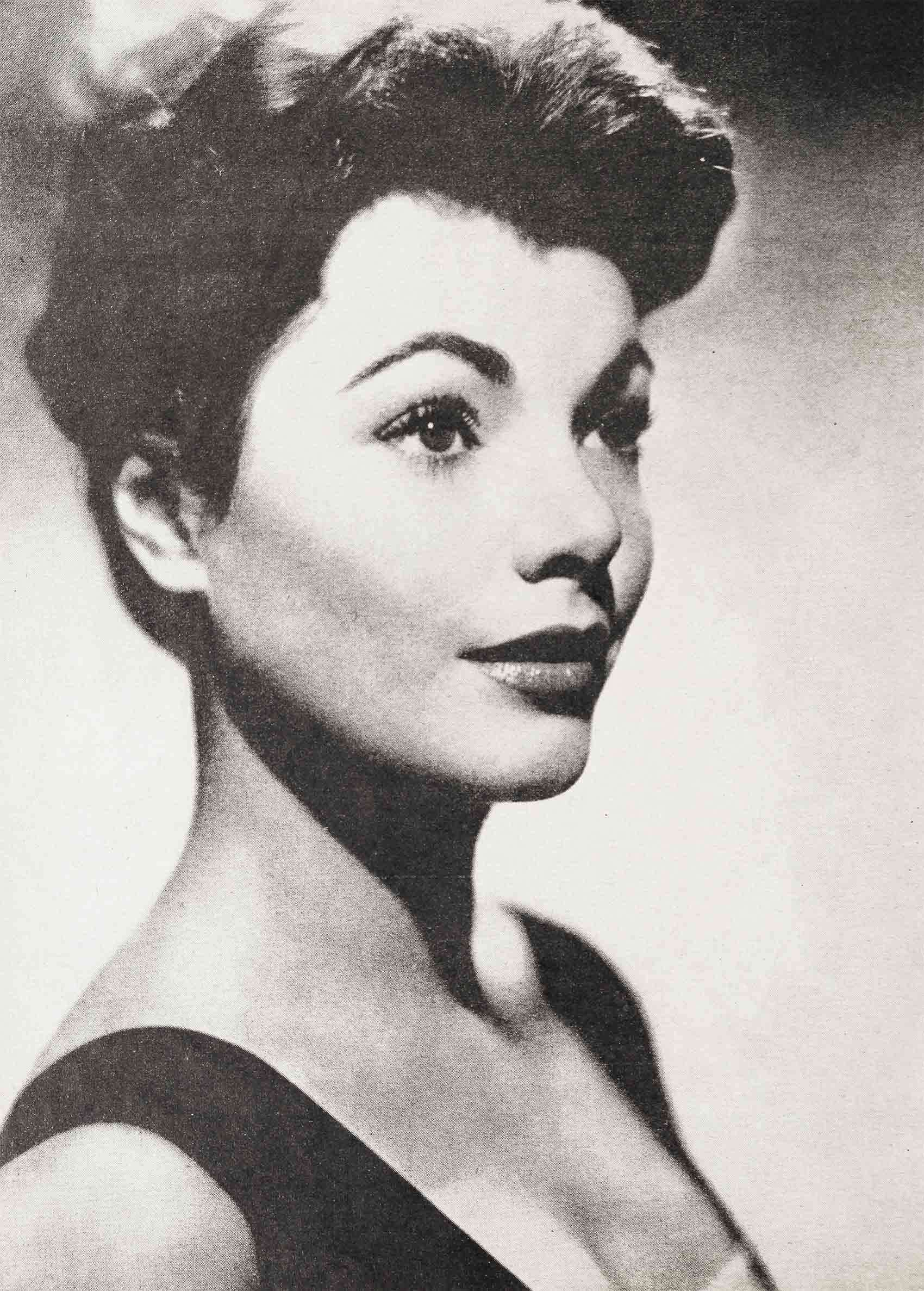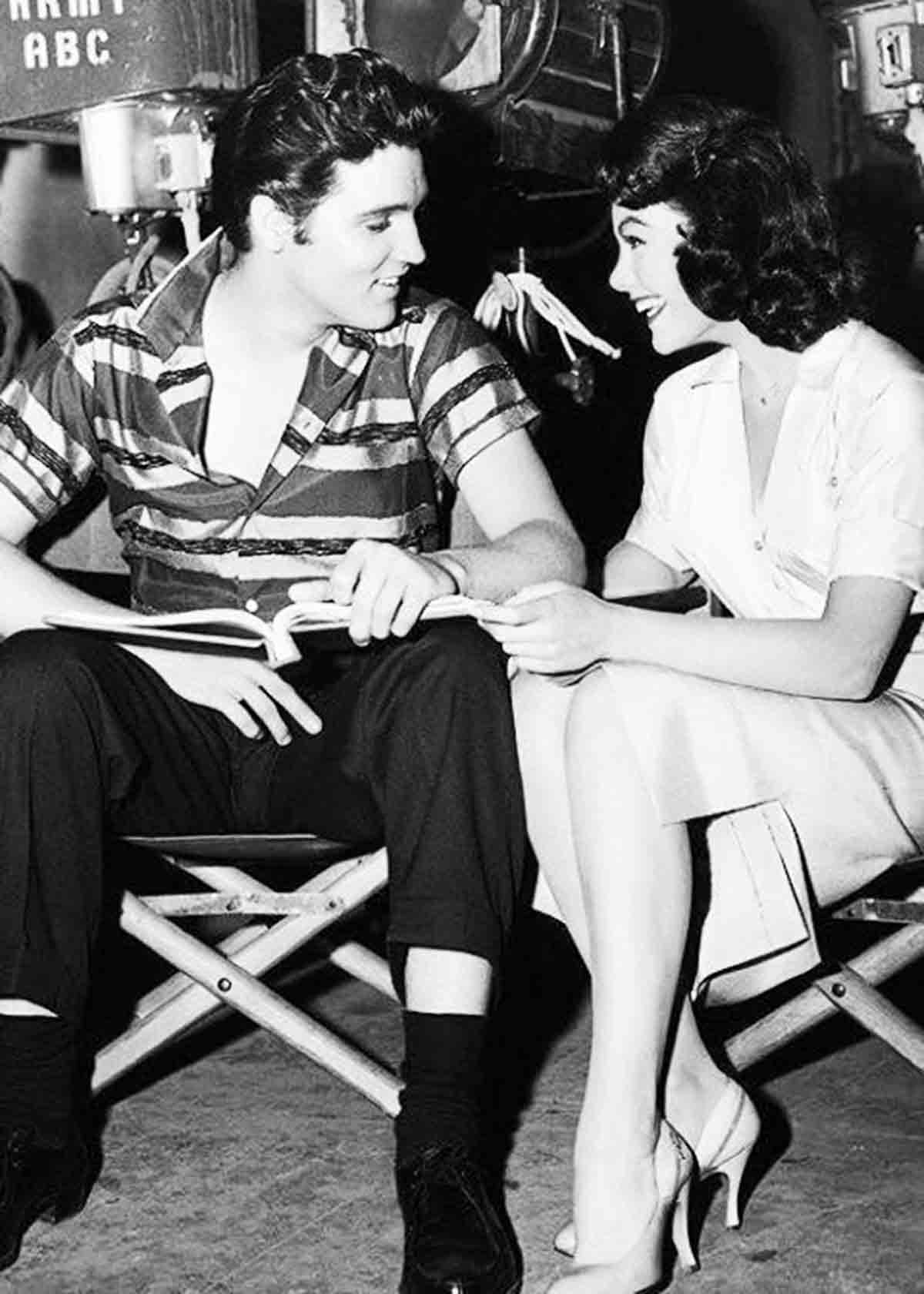
Judy Tyler’s Last Interview
It was the Fourth of July and hot and I had to work. The night before, I’d gotten a phone call from MODERN SCREEN asking me if I couldn’t please have my Elvis Presley story in as soon as possible. I began to work. “I feel a lonely feeling finishing the picture”—
I typed the words—El’s words. I stopped. Somehow something was wrong—I couldn’t get past those few words. I had talked with Elvis only a few days earlier and I had a lot of good stuff. But, still, I had a funny feeling. As if the typewriter keys were fighting my fingers.
As if someone was telling me I shouldn’t be writing that story now, not right now. I looked up and noticed the newspaper lying, folded, on the couch. It was a Los Angeles afternoon paper and it had been delivered a little while earlier. I saw the word Presley splashed across one of the headlines. “I wonder what he’s done,” I thought to myself as I picked up the paper. PRESLEY’S LEADING LADY DIES IN CRASH.
A chill—a very cold chill—raced up my neck. It couldn’t be her, I said to myself. I saw a dark-haired girl in a straw bonnet, very young, very pretty, very bright. She was laughing and as she laughed her eyes twinkled so merrily you would have thought she was the happiest girl in the world—which she had every right to be.
It couldn’t be Judy, I thought, but it was. . . . It happened in a little town named Billy the Kid, Wyoming, on July 4th.
ACTRESS JUDY TYLER, 24, LEADING LADY IN ELVIS PRESLEY’S LATEST PICTURE WAS KILLED HERE YESTERDAY ALONG WITH HER ACTOR HUSBAND AND ANOTHER MOTORIST . . .
Two weeks earlier, to the day, I’d had lunch with Judy in the MGM commissary. It was part of my research on the Elvis story—I’d wanted to talk to someone who’d worked with him recently and Judy had been suggested as the perfect person to do the talking. “She’s wonderful,” a publicity man at the studio had told me, “we’re all crazy about her, she’s so cooperative. Just crazy about her.”
And now she was dead.
I sat down in front of my typewriter a few minutes later. I looked over at my notes, piled high to one side. For a while, I didn’t touch them—didn’t want to touch them. Then, slowly, I picked them up and went through them till I came to a batch headed: J. Tyler, June 19.
I began to read them.
They read exactly like this—
Wearing black pedal pushers, pastel blouse and floppy straw hat with yellow ribbons. Mighty cute. “Don’t tell anybody,” Judy grinned, “but I swiped the hat from wardrobe. I can see it all now . . . the studio cop at the gate will probably stop me when I drive off the lot today and accuse me of trying to make off with stolen goods! But I won’t give it back,” she continued, laughing. “I’ve fallen in love with it.”
Then she looked at the studio publicist, Johnny Rothwell, who joined us for lunch, and said sort of seriously, “Say, you don’t really think they’ll care if I keep it, do you?” She was assured that Metro could afford to part with one straw hat.
“You know I feel kind of funny, this being my last official working day on the lot for a while. But I’ve got a big summer ahead of me. I’m going to do summer stock. Pajama Game, Desire Under the Elms at Provincetown, then Sabrina. But first I’m going on a personal appearance tour for Bop Girl and in between I’m doingPantomime Quiz on TV. Bop Girl Goes Calypso was my first picture . . . we made the whole picture in six days! But it was fun. However, I must admit that at MGM I’ve had some time to turn around. You know, here I’ve been treated like I was the greatest star that ever walked. It’s a wonderful studio. I adore it.

Elvis—the living end
“As for Elvis—well, he’s a doll. The living end! Everybody who meets him falls madly in love with him.”
“Did you, Judy?”
“I said everybody falls in love with him,” Judy smiled. “He’s fantastic, just a fabulous boy. You know I think the most astounding thing was the reaction of the crew to both Elvis and me. They’re the people that count, you know. If the technicians don’t like you, you know it! They’re the people who’ve watched stars come and go. To me they’re more important here than anyone else. To get a reaction from those guys, to look high up at the men on the lights above the set and see tears coming down their cheeks—it’s the greatest reward I know. It’s fine for the big wheels to be nice to you and pay you compliments; that’s part of their job. But these technicians, they’re well paid to do a specialized job and that’s all. And when they started doing extra things for Elvis and me, I knew we’d made the grade.
“But, let me tell you more about Elvis. His dramatic potentials are fabulous. This is only his third picture and you can tell he has a brilliant future ahead of him . . . as an actor. It’s honestly something he wants very much. We had a ball on set. He bought this little foreign car, a Messerschmidt—the kind that you have to lift the top off to get out. Well, it was so tiny we’d climb into it and drive right on the set, right up to the camera, then jump out and say, ‘Well, we’re ready.’
“He’s a born kibitzer, you know. And his singing in this picture is great. There’s one number he sings called Young and Beautiful. Every time he sang it I bawled like a baby. I’d completely break-up. And then he’d rock with Treat Me Nice—here she did a few Presley-type movements— well, I used to move around, too, and tell him that ‘I do Elvis better than he does!’
“When we were shooting or when we were between takes or at lunch we had a chance to talk. Usually it was a pretty serious discussion. Sometimes we’d sing, play records and dance. A lot of times we’d have a constant jam session. We really made a lot of noise . . . I don’t think MGM has ever been so alive!
“Actually, though, there was a lot of business to be attended to and we didn’t get a chance to do too much relaxing. But El and I did get in our share of serious talks. We’d start in, get all wound up. They’d call us for a scene—then we’d come back and pick up with our conversation right where we left off.
“You know, Elvis is crazy about people in show business. Me, I’ve been in it for eleven years. Elvis used to sort of look at me in awe and say, ‘Gee, I’ve only been in this business two years and you . . . well . . . I’ve got a lot of things to learn’ Or whenever he’d see anybody well known, he’d go up to them and smile sort of shy-like and say, ‘I used to see you in the movies all the time when I was a kid! One thing’s for sure—Elvis isn’t wrapped up in himself. He’s interested in everything and everybody.
“Another thing that’s amazing about a personality like Elvis, a guy the girls go wild over, is that men like him too. One day I heard it was really something. I wasn’t working that day . . . they were shooting a fight scene and only the men were working. It was a real rough scene and all the biggest, huskiest stunt men in the business were on the set. When the scene was over there was Elvis in the middle of this group of husky guys and they were all crowding around him asking for his autograph. That’s unusual in this business.

“I had to see you”
“That’s an example of someone else’s reaction to him. Now I’ll tell you mine. He was very gracious to me and gave me a lot of leeway when we were making the picture. He didn’t pull any of this star routine or try to act big-time. Why, last week I really caused a lot of commotion on the set. I was supposed to leave the room and he was to follow me out. I went of the wrong way and walked right through a plate glass door. Elvis grabbed me immediately. I wasn’t hurt very much, luckily. I was more embarrassed than anything else. But I knew it would hold up production and I kept saying ‘I’m sorry.’ Elvis kept holding me and trying to soothe me. The director, Mr. Thorpe, insisted they take me to the studio infirmary. So off I went. I hadn’t been in bed a minute when there was a knock on the door. Elvis came in. He was all out of breath. The infirmary is clear on the other side of the lot. But Elvis had dashed up to his dressing room, changed his clothes and had run all the way over. He was the first person from the set to come in. He stood at the door and I could tell he felt worse than I did. He had his hands in his pockets, and he looked up at me and said, simply, ‘I just had to come over and see if you were okay. Is there anything If can do?’
“You see, there is a bond between us. This was El’s first picture at METRO and mine, too. We were both sort of nervous at first. There was a lot of tension and strain. So we got into the habit of talking to each other about a lot of things aside from work. It made us both relax a little and broke down our fears. It was the beginning of a very real friendship and a real relationship. Elvis has a very serious side that a lot of people, who don’t know him, never get to see. He has a very soft and gracious heart. And he’s very religious.
Toward one goal, together
“There’s one memorable incident in Jailhouse that does stand out in my mind. We had one particularly emotional scene to do. We did it toward the end of the production schedule. We started the scene at ten in the morning. It’s not easy to be emotional at that hour! Anyway, in this scene Elvis has been hurt and is in the hospital. Mickey Shaughnessy and I go to the hospital to see him. It was a real rough scene. Elvis had been operated on and the operation had been a success. But there was a possibility that he would never be able to sing again. Elvis plays the part of a kid who becomes a singing sensation. Mickey is the cause of the injury. He and Elvis had been fighting. The fight was over me. I play a record distributor who has sort of been responsible for Elvis’ career up to the point where he becomes a really big star and then my only job is to see that he cuts his records. Anyway, Mickey talks to Elvis, who is lying in this hospital bed. He pleads for forgiveness. He apologizes. It gets very emotional. I’m supposed to feel funny, too. I don’t know exactly what to say. So I make small talk for a moment and then I look at El and ask simply, ‘How are you? How do you feel?’ Then I break down and tell him I love him. It’s the only time in the picture that I tell him that. I say, ‘Don’t be afraid of love . . . because I love you.’ When we got through with the scene the set was quiet. Everywhere we looked people were crying. I felt so blue that I had a crying jag the whole day. And when we went to see the daily rushes—wow! Usually Elvis and I and some of the rest of the people would go in to see the rushes and we would stomp and cheer and cut up and act silly. But the day we saw the rushes on that scene everyone walked out silently, all choked up. I’ll never forget it. As an actress it taught me a good lesson. I’ve studied acting with a lot of people, including Lee Strasberg at the ACTORS’ STUDIO. I’ve always been told that there’s something special about playing an emotional scene. Don’t push or force it. If the tears don’t come naturally, then don’t try. If you force an emotion the audience can spot it just like that (she snapped her fingers). So you see our experience in making this picture shows how close we must have all been. Elvis and the rest of the cast and crew . . . we had such a terrific sense of being a team . . . working for one goal, together. Our close ness caused that mass bawling session.
THE END
—BY MARCIA BORIE
It is a quote. MODERN SCREEN MAGAZINE OCTOBER 1957




